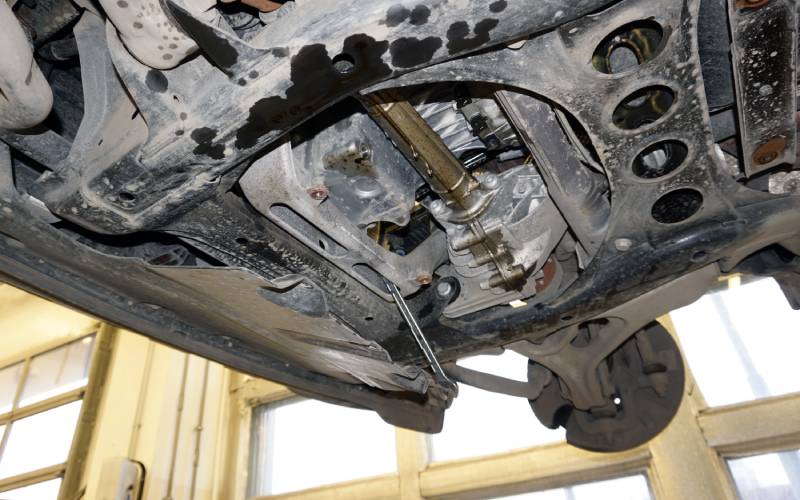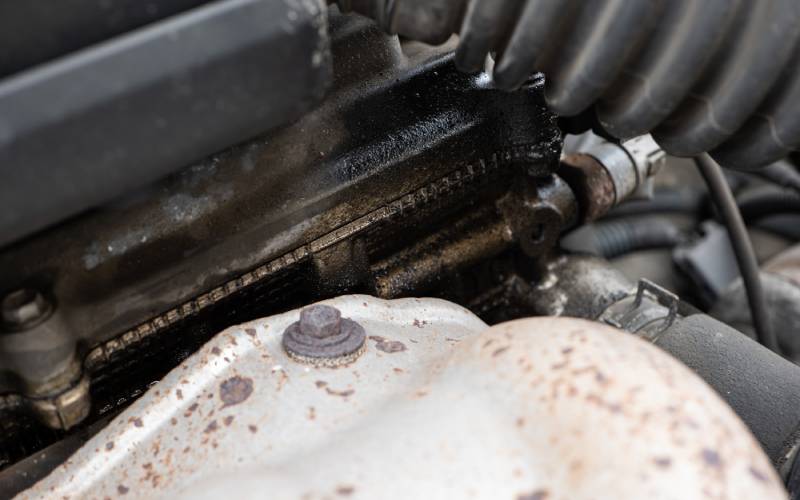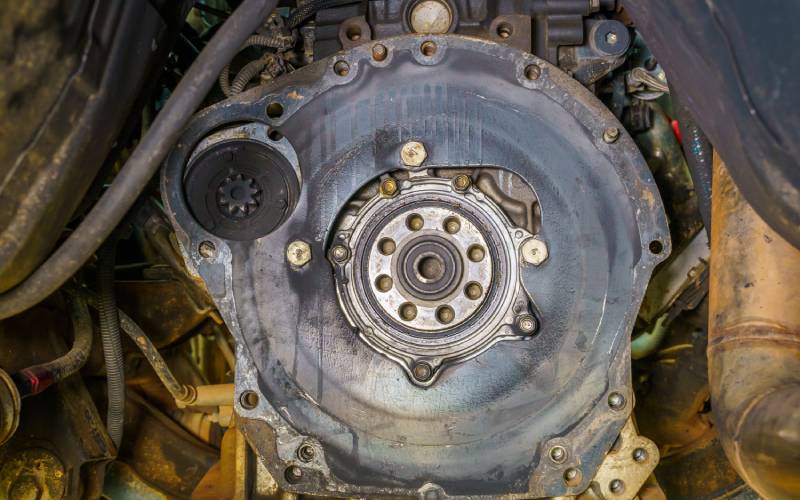Common Causes of Engine Oil Leaks and How To Solve Them

Every car enthusiasts eventually has to deal with an oil leak. Leaks can damage your engine, reduce performance on your vehicle, and cause major problems down the road, so you want to take care of them as soon as possible.
Fortunately, Driven Racing Oil is here to help you identify the common causes of engine oil leaks and how to solve them. The sooner you can identify the causes, the easier it will be for you to protect your vehicle and its engine in the long run.
Introduction to Engine Oil Leaks
Oil leaks aren’t just annoying—they can lead to severe damage if you don’t address them as soon as possible. For car enthusiasts who push their vehicles to the limit, maintaining optimal engine performance is crucial.
Oil leaks can reduce engine efficiency, increase wear and tear, and ultimately lead to costly repairs. Driven Racing Oil wants to help you identify potential sources of oil leaks and arm you with the knowledge to tackle these issues head-on.
The Importance of Regular Maintenance
Preventative maintenance is the first line of defense against engine oil leaks. Consistent monitoring and upkeep can help you spot potential problems before they escalate.
Regular oil changes, inspections, and proactive care ensure your engine remains in top condition. Keeping your engine in good condition not only helps prevent potential oil leaks but helps it last longer and stay in good shape, whether you’re on the road or the racetrack.
Gasket Failures
Gaskets are essential components that seal various sections of your engine. Over time, these gaskets may deteriorate, leading to oil leaks. The valve cover gasket, oil pan gasket, and head gasket are the most common culprits. The biggest enemies of these gaskets are heat, pressure, and simple age, all of which can cause these gaskets to crack or lose their sealing ability. Regular inspection and replacement of worn gaskets can prevent leaks and protect your engine.
When dealing with high-performance engines, you should always try to use quality replacement gaskets. Consider investing in high-performance gaskets capable of withstanding the extreme conditions of racing. Doing so will ensure a secure seal and minimize the risk of leaks during high-speed runs.

Improper Oil Filter Installation
The oil filter plays a critical role in keeping your engine clean by trapping contaminants and debris. However, improper installation can lead to oil leaks. Improperly seating your oil filter—or using one that’s the wrong size—will most likely result in the oil escaping from the engine and causing big problems. You can avoid this by properly installing and tightening the filter and making sure that you’re using the right size for your specific engine.
Regularly changing the oil filter is a basic part of your routine maintenance. High-performance filters for racing engines provide superior filtration and durability. By using high-quality filters, you can reduce the likelihood of leaks and keep your engine running smoothly.
Oil Pan Damage
The oil pan helps hold the engine oil and place and keep it from leaking out. The most common plate damage are cracks, dents, and other ways oil can leak out. Watch out for road debris, impacts, or other disturbances. Frequently inspecting your oil pan for damage and promptly addressing any issues can prevent leaks from becoming a significant problem.
When replacing a damaged oil pan, always install and secure the pan. If you frequently drive in an area with a lot of debris, like on gravel roads, you may want to invest in a stronger oil pan to protect against dents.
Crankshaft Seals
Crankshafts help prevent oil from leaking out of the engine. However, regular wear and tear makes these seals more fragile, leading to more possible leaks. High-performance engines that experience a lot of stress face seal failure more often and require more attention. Regular inspections and prompt replacement of worn seals can maintain engine integrity.
When replacing crankshaft seals, choose high-quality seals compatible with your engine’s specifications. This ensures a secure fit and minimizes the risk of leaks. Taking proactive steps to address seal issues can protect your engine during high-speed runs and keep it performing at its best.
PCV Valve Problems
Another common cause of engine oil leaks is when the Positive Crankcase Ventilation (PCV) valve ends up failing on you. A malfunctioning PCV valve often leads to increased pressure, forcing oil through seals and gaskets, resulting in leaks. Like with most parts, this should be on your inspection checklist, and you should replace it if you notice any unusual pressure buildup or oil around it.
For racing engines, high-performance PCV valves need to handle increased engine demands. These valves offer improved flow and durability, ensuring optimal pressure management. Proper maintenance of the PCV system is vital for preventing oil leaks and maintaining engine performance.
Worn-Out Oil Seals
Oil seals, found in various engine components, prevent oil from escaping. Over time, these seals can wear out, leading to leaks. Common areas prone to wear include camshaft seals, timing cover seals, and rear main seals.
Always use high-quality seals when replacing them and check that they align with the requirements of your specific engine. This guarantees a secure fit and durability under extreme conditions. Addressing worn seals will help maintain engine integrity and prevent costly repairs.

Engine Overheating
Not every oil leak comes from worn down or faulty parts. In some cases, you just might experience a hot engine, and it needs a chance to cool down. Hot engines can degrade gaskets or seals, leaving them vulnerable to leaks. You can help prevent this by installing a proper cooling system and keeping up with it during your regular inspections.
You might want to consider upgrading to high-performance cooling components. Racing radiators, electric fans, and high-flow water pumps can improve cooling efficiency and keep your engine running at optimal temperatures. By maintaining a healthy cooling system, you can protect your engine and prevent oil leaks.
Incorrect Oil Viscosity
A somewhat unexpected cause of oil leaks can come from just using the wrong type of oil. Many high-performance engines require specific oil grades to maintain proper lubrication and protection. Using oil that is too thin or too thick can affect sealing performance and lead to leaks. Always refer to your engine manufacturer’s recommendations for the appropriate oil viscosity.
When selecting oil for your racing engine, consider using synthetic oils designed for high-performance applications. These oils offer superior protection and stability, reducing the risk of leaks and enhancing engine performance. Proper oil selection is crucial for maintaining engine health and preventing leaks.
Are you passionate about preserving the performance of your vehicle? Driven Racing Oil has a wide selection of classic car engine oil to provide superior protection and lubrication, ensuring your prized possession runs smoothly and efficiently. Trust Driven Racing Oil to keep your classic engine performing at its peak. Experience the difference today by choosing the oil that understands your engine’s heritage and demands.

You must login to post comments.